Charlotte's Web (2006)
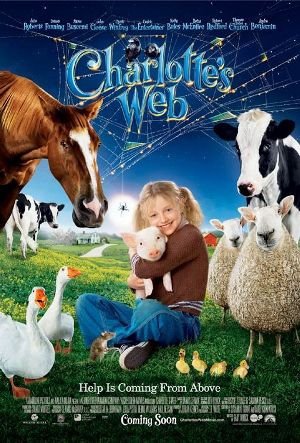
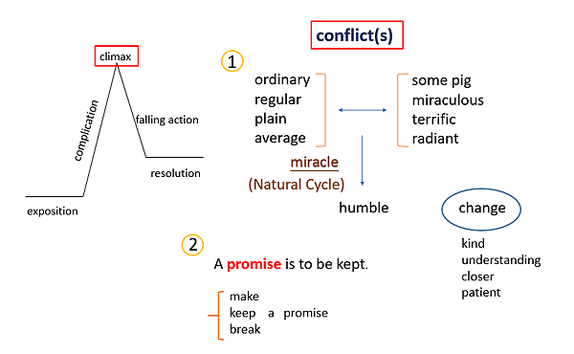
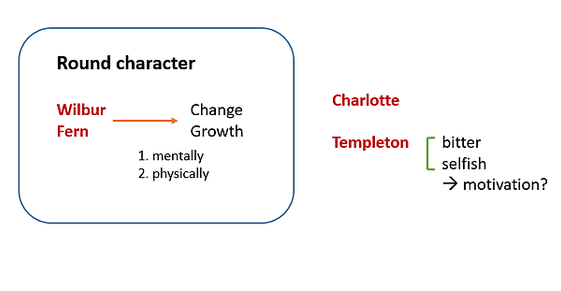
Character
Round vs. flat
In his book Aspects of the Novel, E. M. Forster defined two basic types of characters, with regard to their qualities, functions, and importance for the development of the novel: flat characters and round characters. "Flat" characters are two-dimensional in that they are relatively uncomplicated. By contrast, "round" characters are complex figures with many different characteristics that develop, sometimes to an extent sufficient to surprise the reader.
Types by role
Characters can be classified by their role in the story. Some common roles are:
- Stock character - standard, predictable background characters
- Protagonist - the hero or central character
- Antagonist - the villain
- Antihero - a protagonist without heroic qualities
- Foil (literature) - exists for contrast with the main characters. See also comic relief and sidekick.
https://en.wikipedia.org/wiki/Character_(arts)#Round_vs._flat
Word
1. fetch: to go and get something; to be sold for a particular amount of money, especially at an auction
-
fetch someone something: I asked my son to fetch me a drink of water.
fetch something for someone: Let me fetch a chair for you.
fetch something from something: We used to go and fetch milk from the farm.
-
fetch a cab
-
The painting is expected to fetch up to £220,000.
2. magnum opus: the Latin for "great work", is the masterpiece, the greatest work of a writer, artist, or composer.
3. languish: to fail to be successful or to improve; to remain in a difficult or unpleasant situation for a long time
- Oil prices continue to languish at $10.79 a barrel.
- The children are languishing in orphanages waiting for adoption.
4. ferris wheel

A Ferris wheel (sometimes called a big wheel, observation wheel, or, in the case of the very tallest examples, giant wheel) is a nonbuilding structure consisting of a rotating upright wheel with multiple passenger-carrying components (commonly referred to as passenger cars, cabins, capsules, gondolas, or pods) attached to the rim in such a way that as the wheel turns, they are kept upright, usually by gravity.
The original Ferris Wheel was designed and constructed by George Washington Gale Ferris Jr. as a landmark for the 1893 World's Columbian Exposition in Chicago. The generic term Ferris wheel is now used for all such structures, which have become the most common type of amusement ride at state fairs in the United States.
https://en.wikipedia.org/wiki/Ferris_wheel
Class Notes
1. The Tyger
"The Tyger" is a poem by the English poet William Blake published in 1794 as part of the Songs of Experience collection. Literary critic Alfred Kazin calls it "the most famous of his poems," and The Cambridge Companion to William Blake says it is "the most anthologized poem in English." It is one of Blake's most reinterpreted and arranged works.
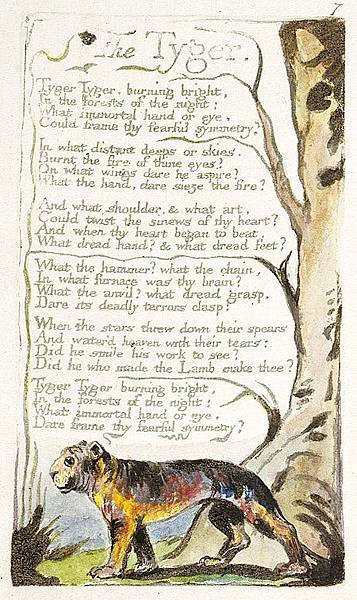
Tyger Tyger, burning bright,
In the forests of the night;
What immortal hand or eye,
Could frame thy fearful symmetry?
In what distant deeps or skies.
Burnt the fire of thine eyes?
On what wings dare he aspire?
What the hand, dare seize the fire?
And what shoulder, & what art,
Could twist the sinews of thy heart?
And when thy heart began to beat,
What dread hand? & what dread feet?
What the hammer? what the chain,
In what furnace was thy brain?
What the anvil? what dread grasp,
Dare its deadly terrors clasp!
When the stars threw down their spears
And water'd heaven with their tears:
Did he smile his work to see?
Did he who made the Lamb make thee?
Tyger Tyger burning bright,
In the forests of the night:
What immortal hand or eye,
Dare frame thy fearful symmetry?
In "The Tyger," he presents a poem of "triumphant human awareness," and "a hymn to pure being," according to Kazin.
https://en.wikipedia.org/wiki/The_Tyger
https://www.poetryfoundation.org/poems-and-poets/poems/detail/43687
2. Alliteration
Alliteration is a stylistic literary device identified by the repeated sound of the first letter in a series of multiple words, or the repetition of the same letter sounds in stressed syllables of a phrase.
https://en.wikipedia.org/wiki/Alliteration#Literature
e.g. To Helen (by Edgar Allan Poe)
Helen, thy beauty is to me
Like those Nicean barks of yore
That gently, o'er a perfumed sea,
The weary, way-worn wanderer bore
To his own native shore.
On desperate seas long wont to roam,
Thy hyacinth hair, thy classic face,
Thy Naiad airs have brought me home
To the glory that was Greece,
And the grandeur that was Rome.
Lo, in yon brilliant window-niche
How statue-like I see thee stand,
The agate lamp within thy hand,
Ah! Psyche, from the regions which
Are Holy Land!
https://en.wikipedia.org/wiki/To_Helen#Full_poem
3. Onomatopoeia
An onomatopoeia is a word that phonetically imitates, resembles or suggests the source of the sound that it describes. As an uncountable noun, onomatopoeia refers to the property of such words.
Common occurrences of onomatopoeias include animal noises such as "oink", "miaow" (or "meow"), "roar" or "chirp".
Onomatopoeias are not the same across all languages; they conform to some extent to the broader linguistic system they are part of;hence the sound of a clock may be tick tock in English, dī dā in Mandarin, or katchin katchin in Japanese, or "tik-tik" (टिक-टिक) in Hindi.
https://en.wikipedia.org/wiki/Onomatopoeia
4. Animal Idioms
|
idiom |
meaning |
example sentence |
|
ants in one's pants |
unable to sit still or remain calm out of nervousness or excitement |
Lisa had ants in her pants the day before her interview. |
|
(the) birds and the bees |
sex education |
I learned about the birds and the bees when my baby brother was born. |
|
cat nap |
a short sleep |
I'm going to have a cat nap while you're cooking dinner. |
|
cat's got one's tongue |
said about someone who doesn't speak (usually due to shyness) |
It looks like the cat's got your tongue, Lucy. Are you always this quiet? |
|
chicken out |
to decide not to do something out of fear (usually just before) |
I was going to take a ride on Geoff's motorcyle, but I chickened out when he gave me a helmet to wear. |
|
clam up |
become quiet suddenly |
Arthur clammed up when I asked him about his family. |
|
copy cat |
a person who does the same thing as someone else |
My sister is such a copy cat. First she bought the same car as me, and now she's applying to my school. |
|
dog days |
very hot days |
I sleep in the basement during the dog days of August. |
|
dropping like flies |
dying/giving up quickly |
My roses are dropping like flies in this early frost. |
|
eager beaver |
a person who is excited about doing certain work |
Ever since he got his new drill set my husband has been an eager beaver around the house. |
|
fishy |
odd, suspicious |
I knew something fishy was going on when I saw all of my friends' cars in my mom's driveway. |
|
have a cow |
get extremely upset (often over something minor) |
My teacher had a cow when she realized nobody had done the homework. |
|
hold your horses |
wait and be patient |
Hold your horses! I'll be done in the washroom in a minute. |
|
holy cow! |
Wow, I'm surprised! |
Holy cow! I can't believe you ate everything on your plate. |
|
horse around |
play roughly |
If you're going to horse around, please go outside. |
|
get the lion's share |
get the greatest percentage |
My aunt got the lion's share of the inheritance. |
|
in the dog house |
in trouble with another person |
I don't think Marsha is coming out tonight. She's still in the dog house for forgetting Aaron's birthday. |
|
kill two birds with one stone |
get two things done at once |
If you pick the groceries up when you drop George off for his shift, you will kill two birds with one stone. |
|
kitty corner |
diagonal direction |
The gas station is kitty corner to the library. |
|
let the cat out of the bag |
reveal a secret |
Who let the cat out of the bag about the surprise party? |
|
(a) little bird told me |
I heard something (usually secretive or unknown) from someone (not named) |
A little bird told me that you are thinking of quitting your job. |
|
make a beeline |
go straight for something |
My grandma made a beeline for the smoking room as soon as she got off the airplane. |
|
monkey see, monkey do |
silly/unintelligent people tend to copy each other's actions |
Our one-year-old is saying bad words now. I told my husband, "Monkey see, monkey do!" |
|
nest egg |
money saved for the future |
We have a nest egg that we might have to use if Jim goes on sick leave. |
|
pig out |
eat a lot of something |
I pigged out on pancakes so I don't have room for lunch. |
|
raining cats and dogs |
raining heavily |
I forgot my umbrella, and it was raining cats and dogs. |
|
rat race |
fierce, competitive struggle for power, position etc |
I'm ready to leave this rat race and retire in Mexico. |
|
smell a rat |
begin to suspect trickery etc |
I asked my brothers not to tell my parents that I went out, but I could smell a rat as soon as I opened the door. |
|
straight from the horse's mouth |
directly from the original source |
I know Jenny is pregnant, because I heard it straight from the horse's mouth. |
|
take the bull by the horns |
face a challenge or danger boldly |
If you really think you deserve a promotion, you'll have to take the bull by the horns. |
|
until the cows come home |
for a very long time |
I could eat pizza and ice-cream until the cows come home. |
https://www.englishclub.com/vocabulary/idioms-animal.htm
http://www.learnenglish.de/idioms/animaldioms.html
http://acfold-1.blogspot.tw/2013/07/12-7-21-2013.html
5. John Donne

John Donne (22 January 1573 – 31 March 1631) was an English poet and a cleric in the Church of England. He is considered the pre-eminent representative of the metaphysical poets. His works are noted for their strong, sensual style and include sonnets, love poems, religious poems, Latin translations, epigrams, elegies, songs, satires and sermons. His poetry is noted for its vibrancy of language and inventiveness of metaphor, especially compared to that of his contemporaries.
https://en.wikipedia.org/wiki/John_Donne
Death Be Not Proud
Sonnet X, also known by part of its first line as "Death Be Not Proud", is a fourteen-line poem, or sonnet, by English poet John Donne (1572–1631), one of the leading figures in the metaphysical poets of sixteenth-century English literature.
https://en.wikipedia.org/wiki/Death_Be_Not_Proud_(poem)
The Flea
The speaker uses the occasion of a flea hopping from himself to a young lady as an excuse to argue that the two of them should make love. Since in the flea their blood is mixed together, he says that they have already been made as one in the body of the flea. Besides, the flea pricked her and got what it wanted without having to woo her. The flea’s bite and mingling of their bloods is not considered a sin, so why should their love-making?
In the second stanza the speaker attempts to prevent the woman from killing the flea. He argues that since the flea contains the “life” of both herself and the speaker, she would be guilty both of suicide and a triple homicide in killing it.
The woman in question is obviously not convinced, for in the third stanza she has killed the flea with a fingernail. The speaker then turns this around to point out that, although the flea which contained portions of their lives is dead, neither of them is the weaker for it. If this commingling of bodily fluids can leave no lasting effect, then why does she hesitate to join with him in sexual intimacy? After all, her honor will be equally undiminished.
http://www.gradesaver.com/donne-poems/study-guide/summary-the-flea
http://shaoyuli101.pixnet.net/blog/post/6327473-the-flea-by-john-donne
No Man Is An Island
No man is an island,
Entire of itself,
Every man is a piece of the continent,
A part of the main.
If a clod be washed away by the sea,
Europe is the less.
As well as if a promontory were.
As well as if a manor of thy friend's
Or of thine own were:
Any man's death diminishes me,
Because I am involved in mankind,
And therefore never send to know for whom the bell tolls;
It tolls for thee.
https://www.goodreads.com/work/quotes/6791114-no-man-is-an-island
A Valediction: Forbidding Mourning
"A Valediction: Forbidding Mourning" is a metaphysical poem by John Donne. Written in 1611 or 1612 for his wife Anne before he left on a trip to Continental Europe, "A Valediction" is a 36-line love poem that was first published in the 1633 collection Songs and Sonnets, two years after Donne's death. Based on the theme of two lovers about to part for an extended time, the poem is notable for its use of conceits and ingenious analogies to describe the couple's relationship.
Donne's use of a drafting compass as an analogy for the couple—two points, inextricably linked—has been both praised as an example of his "virtuoso display of similitude", and also criticised as an illustration of the excesses of metaphysical poetry; despite detractors, it remains "the best known sustained conceit" in English poetry.
https://en.wikipedia.org/wiki/A_Valediction:_Forbidding_Mourning
6. Edgar Allan Poe
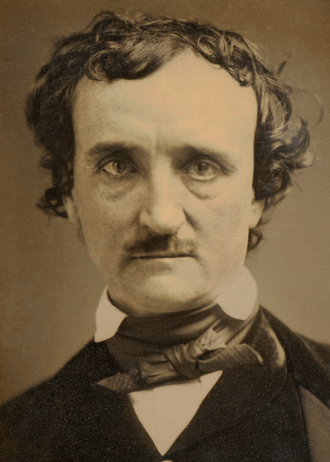
Edgar Allan Poe (January 19, 1809 – October 7, 1849) was an American writer, editor, and literary critic. Poe is best known for his poetry and short stories, particularly his tales of mystery and the macabre. He is widely regarded as a central figure of Romanticism in the United States and American literature as a whole, and he was one of the country's earliest practitioners of the short story. Poe is generally considered the inventor of the detective fiction genre and is further credited with contributing to the emerging genre of science fiction. He was the first well-known American writer to try to earn a living through writing alone, resulting in a financially difficult life and career.
https://en.wikipedia.org/wiki/Edgar_Allan_Poe
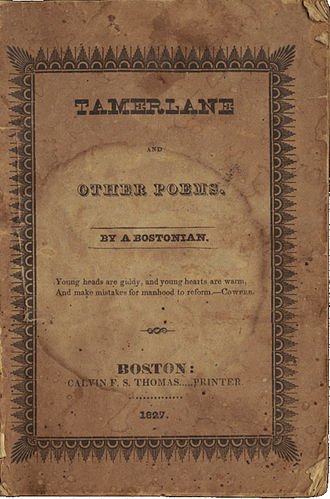
Tamerlane and Other Poems is the first published work by American writer Edgar Allan Poe. The short collection of poems was first published in 1827. Today, it is believed only 12 copies of the collection still exist.
https://en.wikipedia.org/wiki/Tamerlane_and_Other_Poems
7. The Scarlet Letter
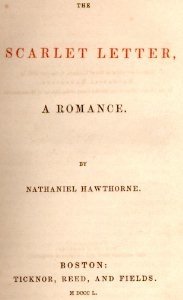
The Scarlet Letter: A Romance is an 1850 work of fiction in a historical setting, written by American author Nathaniel Hawthorne. The book is considered to be his "masterwork". Set in 17th-century Puritan Boston, Massachusetts, during the years 1642 to 1649, it tells the story of Hester Prynne, who conceives a daughter through an affair and struggles to create a new life of repentance and dignity. Throughout the book, Hawthorne explores themes of legalism, sin, and guilt.
https://en.wikipedia.org/wiki/The_Scarlet_Letter
|
Nathaniel Hawthorne |
|
|
Nathaniel Hawthorne in the 1860s |
|
|
Born |
Nathaniel Hathorne |
|
Died |
May 19, 1864 (aged 59) |
|
Language |
English |
|
Alma mater |
|
|
Notable works |
The House of the Seven Gables, Twice-Told Tales, The Scarlet Letter |
|
Spouse |
Sophia Peabody (m. 1842–64; his death) |
|
Signature |
|
https://en.wikipedia.org/wiki/Nathaniel_Hawthorne
8. La Comédie humaine
La Comédie humaine (French pronunciation: [la kɔmedi ymɛn], The Human Comedy) is the title of Honoré de Balzac's (1799–1850) multi-volume collection of interlinked novels and stories depicting French society in the period of the Restoration and the July Monarchy (1815–1848).
The Comédie humaine consists of 91 finished works (stories, novels or analytical essays) and 46 unfinished works (some of which exist only as titles). It does not include Balzac's five theatrical plays or his collection of humorous tales, the "Contes drolatiques" (1832–37). The title of the series is usually considered an allusion to Dante's Divine Comedy; while Ferdinand Brunetière, the famous French literary critic, suggests that it may stem from poems by Alfred de Musset or Alfred de Vigny. While Balzac sought the comprehensive scope of Dante, his title indicates the worldly, human concerns of a realist novelist. The stories are placed in a variety of settings, with characters reappearing in multiple stories.
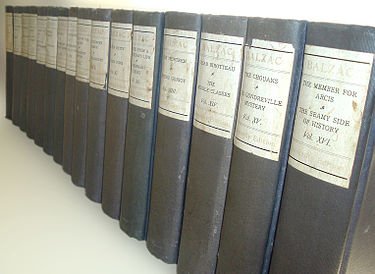
https://en.wikipedia.org/wiki/La_Com%C3%A9die_humaine
|
Honoré de Balzac |
|
|
|
|
|
Born |
Honoré Balzac |
|
Died |
18 August 1850 (aged 51) |
|
Resting place |
Père Lachaise Cemetery, Paris |
|
Occupation |
Writer, critic, journalist, printer |
|
Nationality |
French |
|
Alma mater |
|
|
Genre |
Novel, dramaturgy, essay |
|
Literary movement |
|
|
Notable works |
|
|
Notable awards |
|
|
Years active |
1829–1850 |
|
Spouse |
Ewelina Hańska (m. 1850) |
|
Signature |
|
https://en.wikipedia.org/wiki/Honor%C3%A9_de_Balzac
9. Oxymoron
An oxymoron (usual plural oxymorons, less commonly the Greek-style oxymora) is a figure of speech that juxtaposes elements that appear to be contradictory, but which contain a concealed point. Oxymorons appear in a variety of contexts, including inadvertent errors (such as "ground pilot") and literary oxymorons crafted to reveal a paradox.
- ordinary miracle
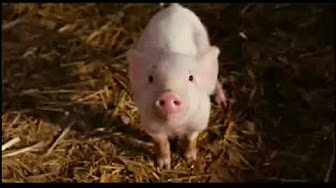
-
Sarah McLachlan Ordinary miracle with lyrics
https://www.youtube.com/watch?v=rweU-FFE6Ww
- bitter sweet
- sweet sorrow
Shakespeare: Romeo and Juliet
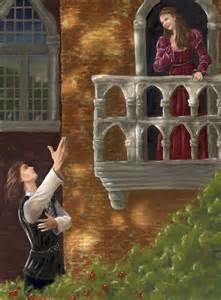
Parting is such sweet sorrow
Juliet:
'Tis almost morning, I would have thee gone—
And yet no farther than a wan-ton's bird,
That lets it hop a little from his hand,
Like a poor prisoner in his twisted gyves,
And with a silken thread plucks it back again,
So loving-jealous of his liberty.
Romeo:
I would I were thy bird.
Juliet:
Sweet, so would I,
Yet I should kill thee with much cherishing.
Good night, good night! Parting is such sweet sorrow,
That I shall say good night till it be morrow. [Exit above]







 留言列表
留言列表

